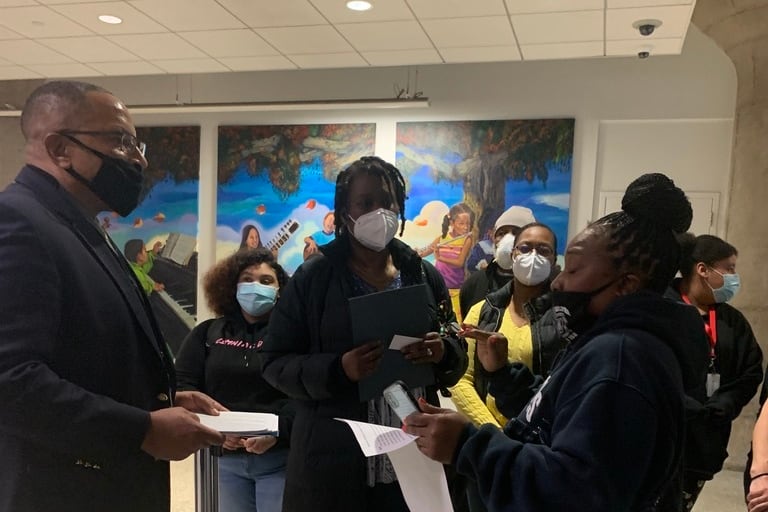About two dozen parents, students, and teachers from Paul Robeson High School protested in front of Philadelphia district headquarters Tuesday, saying that their school building lacks ventilation and is not safe.
“When do the risks become too great for our children?” said parent Sherice Workman. She said that the building is hot all the time, even in winter, because it only has air conditioning in a few rooms. Protestors said students don’t have access to safe drinking water because the school’s hydration stations aren’t always working and water fountains may not be safe.
Student Ciani Pagan said she suffered from dehydration and nosebleeds because she didn’t want to drink water at school. “We feel the school district is not doing anything,” she said.
“We don’t have proper ventilation, the air conditioning doesn’t work, we have only two bathrooms and they don’t work properly,” parent Mina Quarles told Hill. “It’s not safe for our kids to be there, not just our kids, not staff, our teachers.”
The Robeson group asked to meet with school officials, and deputy chief operating officer Oz Hill talked to them. He thanked them for their concern but made no commitments.
The Robeson building in West Philadelphia was built in the 1950s.
The group of about two dozen people presented Hill with petitions signed, they said, by all students, faculty and parents at the school, which has an enrollment of about 300. They said they expect answers by March 4 or will take further action but didn’t say what that action would be.
District spokesperson Monica Lewis issued a statement saying that “a number of projects have been successfully completed” at the school, including ventilation repairs and a boiler replacement.
She added that the district must “constantly balance our needs and priorities” against its resources for more than 200 buildings.
Before the Robeson protest, about 20 people gathered in a light rain to protest unsafe conditions across the district, which before the pandemic was plagued with temporary school closures often due to damaged asbestos. Student groups supported by Parents United for Public Schools, the Home and School Council, and the Alliance of Philadelphia Public Schools sponsored the protest.
“Students are standing up for their rights,” said HSC president Shakeda Gaines. Besides quicker attention to building repairs, speakers also want more stringent COVID-19 protocols.
Gaines said that “many students do not feel safe at school.”
Student Qawyyah Powers, who attends Science Leadership Academy @ Beeber, said she was worried that students are not told when a teacher or another student has COVID. Spokesperson Lewis disputed that, saying that anyone who is considered a “close contact” of someone who tests positive is always notified,
Powers said not all students always wear masks, she said, and they are not regularly tested, although teachers are.
“I want to be tested in school,” Powers said.
COVID-19 cases are declining precipitously in Philadelphia, and Lewis said that no schools have paused in-person instruction this month due to COVID cases or insufficient staffing. She said the district tests vaccinated staff once a week and unvaccinated staff twice a week. Students are not tested unless they participate in athletics or other after school activities.
Dale Mezzacappa is a senior writer for Chalkbeat Philadelphia, where she covers K-12 schools and early childhood education in Philadelphia. Contact Dale at dmezzacappa@chalkbeat.org





